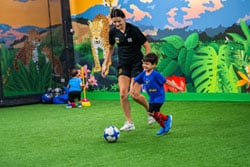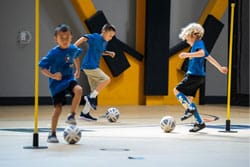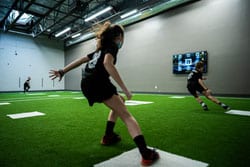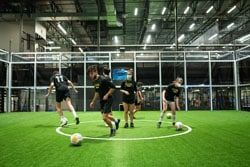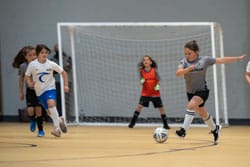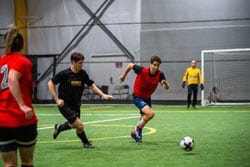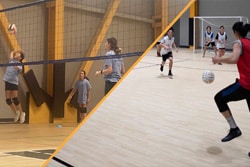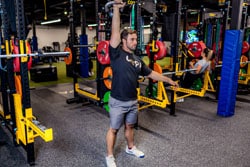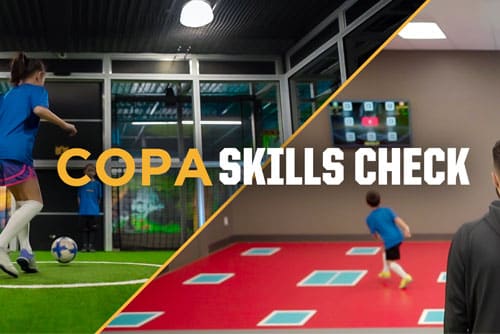Rebirth through Tech: Embracing a New Path in the Beautiful Game

Hannah Diaz – professional soccer player currently with Orca Kamogawa FC and formerly NWSL Houston Dash
When I came to COPA, I was at a tipping point in my career. Twenty-six, physically in my prime. Japan, France, and the US on my resume. I had competed with and against the top teams and players in the world. But in 2022, my stint with the NWSL was cut short, quite literally, and I was left contractless in a tough market for a player like me.
I have and always will be described as a versatile player. A natural number ten, but with the speed of a seven, the drive of a nine, and the grit of a two. As a professional I’ve played seven different positions, none of them consistently, a blessing as a young player but a curse as I find myself rounding a corner and closing in on vet status. Most coaches celebrate me, but every once in a while, they won’t know what to do with me.
The NWSL didn’t know what to do with me and I was cast out like a waste of space.
When you are cut from a roster that action alone sends a signal, to whoever might listen, that you are not good enough. That signal plays on a loop in your mind until you either succumb to it or choose to drown it out. For 250 days I had to wrestle with a failure that did not reflect who I was but had been branded on me. I had to learn to navigate the environment that getting cut creates. Daily interactions quickly became tiresome. Are you retiring from soccer? What will you do next? How long do you want to keep playing? Or the dagger—You did your best.
I did do my best, but my best was not the pinnacle, it was not the top of the mountain, I did not feel in myself a plateau or any momentary relief. I felt like I was halfway to something, getting my second wind, and finally starting to sweat, when suddenly I had to carry the weight of unmet expectations. I welcomed the extra baggage, but I knew the reality was I had no evidence proving my worth. I needed another chance, an opportunity to continue to climb.
When sport meets money the player becomes an investment, an asset, and if you cannot prove you are valuable, then any right-minded management has no incentive to take a chance on you. Talent is not a scarcity in the world of football, especially in the United States. Teams are in the talent business, and every business needs a reference point—a threshold that proves value. Right now, that reference point is unfixed because it is provided by human judgment. Coaches, managers, owners. So this threshold, and therefore value, bounces around depending on the individual’s needs, their experiences, and ultimately their biases.
So the question becomes, how can you properly value something without some sort of standard? Some sort of unbiased test?
When COPA launched their COPA Score, I was able to bring in several professionals to take the assessment. Former and current national team players, starters, and playmakers in the NWSL, players that I have played with and against throughout my career. The assessment consists of a series of standardized tests, captured and scored with the use of technology, that is designed to give each player a number that reflects their athleticism, technical ability, and decision-making. That number is then used in relation to other players within the same age group or team or level. In short, the COPA Score provides an unbiased reference point for the player, coaches, recruiters, and organizations as a whole.
My experience at COPA has given me many things. I spent weeks training with these talented players, showing them the facility and capabilities of the technology that COPA has to offer. I was excited to spend time with my once colleagues, now friends, but the competitor in me was also excited for the opportunity to prove to myself that I was right on track and deserved the career I was trying so hard to hold on to. I needed validation that I still had value at the highest level. COPA gave me my confidence back.
At the very top of any profession, especially a profession in performance, confidence is often the only separator between those who make it and those who don’t. You have to hold your confidence in a room full of elites, under high pressure, and it must remain consistent. The challenge comes when you enter an environment that doesn’t reflect your confidence. It begins to feel ill-gotten—it times out. At the professional level, if you are honest with yourself, it is difficult to say you are worth more than the person next to you when they could replace you without missing a beat. Once you let your confidence waver, that killer instinct falls asleep and you might as well hang up your boots because you’ll get eaten up anyway.
My killer was still there, locked inside me, just waiting for the opportunity to breathe again. So when it was my turn to step in the skills.lab Arena and take the assessment, I had something to prove.
This is the difference between an amateur and a professional, and in my opinion the difference between a player that excels at COPA and one that doesn’t: you have to train like you have a chip on your shoulder. Whether that means that you have never been a top player, have been told you are not a top player, or you are a top player that wants to remain that way, you have to train like there is always someone coming for your number. Complacency kills growth.
I left COPA knowing that my score was one of the best in the group. My number reflected what I knew to be true about myself, but it also reflected how much further I could go. With the skill and athletic breakdown COPA provides, each player suddenly has a method to train in a way that directly attacks each weakness and sharpens any strengths.
It was immediately clear to me how necessary this was not only to my development, but the development of the world of football. Not only does COPA offer a training method that eradicates complacency, but it has also provided a method of recruitment and assessment that relinquishes the intrusion of human variability. Sometimes the numbers can vary day to day due to fatigue or focus, but they never lie. By creating a standard like this, opportunities are suddenly available for players to prove their worth.
While I couldn’t take my score into an NWSL team and use it as a means to get a contract, I am hopeful that a player like me will be able to do just that in the near future. The opportunities for players are expanding by the day, but the filtration system between players and those opportunities is broken. Too many players are slipping through the cracks, not enough talent is being seen, and unfortunately, futures are reliant on the opinion of sometimes just one individual.
COPA has democratized the talent business with their facility. I am thankful to have experienced COPA at such a pivotal moment in my career, and as I begin my next contract I feel more prepared than I have in the past. But, I can’t help feeling jealous that the next generation is going to have such a promising facility to aid in their growth.
Written by,
Hannah Diaz
Hannah Diaz
Share this post
Tagged Blog


